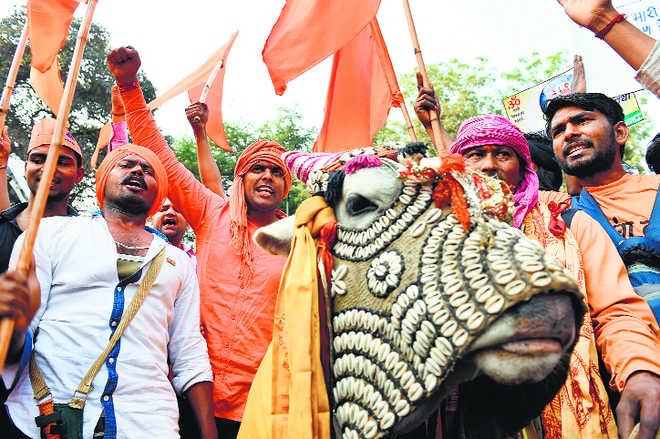The Argumentative Indians
Gaurav Kanthwal
Is this democratically elected government muzzling the voice of dissent? Are we living in times when intolerance is on the rise? Is nationalism getting overbearing in our everyday life? Has cow vigilantism gone too far in its overzealousness?
These are some of the vexing questions that newspapers and TV channels try to sort out on a daily basis. From news anchors to radio jockeys (RJs) to colleagues to domestic help, everyone has his own take on them. The causal but disparate voices mould opinions and go a long way in a person forming his worldview.
But well-researched books by virtue of being comprehensive and analytical have a greater effect on readers.
Ramachandra Guha’s Democrats and Dissenters (2016) and Amartya Sen’s The Argumentative Indian (2005) are two such books, though different in approach, which help in better understanding of India’s tradition of dissent.
Ashok Vajpeyi’s book, India Dissents ..., is a reaffirmation of Indian tradition of discussing, debating and arguing before arriving at a conclusion in every sphere of human life. Politics, religion, philosophy, metaphysics and languages, from times immemorial, have all been complemented by differing views, he says.
Vajpeyi’s focus, of course, remains on Indian polity which is facing testing times. The 75-year-old, a Hindi poet-critic, translator, editor and culture-activist, has edited articles, poems, speeches, reports, essays and letters of some of India’s best thinkers to emphasise these invaluable Indian traits.
In his introduction to the book, the editor writes that the tradition of dissenting originates from India’s plurality which accommodates differences; and differences embody and enact dissent. Vajpeyi’s observation of India’s pluralism in thoughts, philosophies, religions, languages, castes and customs is conveyed in entirety and very concisely to the readers to set them up for a vast treatise.
He quotes Nasadiya Sukta (The Hymn of Creation) from the Rigveda to trace the genesis of Indian skepticism. Nobel laureate Dr Amartya Sen in his book, The Argumentative Indian, too, has quoted the same text as the beginning of radical doubt. But who really knows? Who will here proclaim it? Whence was it produced? Whence is this creation? The gods came afterwards, with the creation of this universe… only he knows—or perhaps he does not know.
Here Vajpeyi sees doubt and scepticism, but for a layman, the text appears to be embedded with amazement, rather than doubt or scepticism. Literally, it is more an act of marvelling the creation and less of questioning is existence.
The title of the book expresses intent to traverse through the history of dissent in India through the 3,000 years of difference, doubt and argument. But in actuality, the book focuses more on recent developments.
The ancient texts, Buddhism, Jainism, Bhakti movement, Sufism and Urdu poets have been dealt in just 60-odd pages. The Indian independence movement till the imposition of Emergency, a period in Indian history which saw the tradition of dissent at its best, take up another 200 pages.
Issues such as nationalism, religious intolerance, faith and superstition, cow vigilantism, feminism and suppression of minorities, effectively dominate the discourse.
“Forty years after that dark period (The Emergency) in Independent India’s history, the spirit of democracy is being undermined and subverted again. In just over three years in office, it (Bharatiya Janata Party (BJP) it has either directly suppressed dissent…There are open attempts to punish dissent by raising the bogey of beef-eating, religious conversion, love jihad, national security or ‘hurt sentiments’,” Vajpeyi lays bare his political inclinations. By the time a reader comes to an end of the book, there is a growing feeling that Vajpeyi, besides highlighting the tradition of dissent, is also veering towards politics.
In a vibrant and evolving democracy like India, it is highly desirable for every citizen to air his/her differences, share his doubt and argue in favour of his opinion. At the same time, citizens are also required to strike a balance in contesting views so as not to fall in the trap of propaganda. Because what we are witnessing these days is a slugfest between the state narrative and the voices of dissent, and much of it falls in the realm of polemics.










